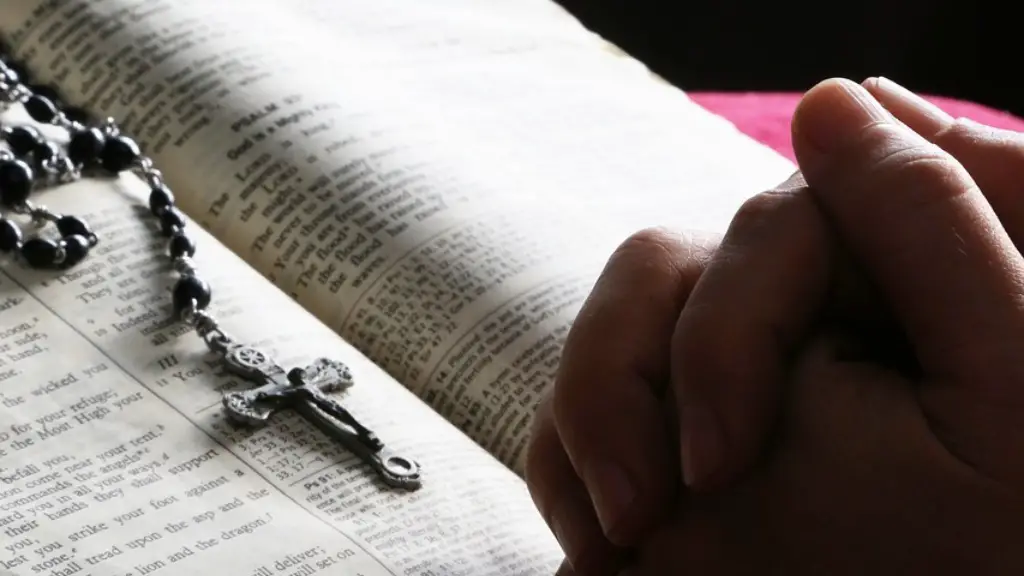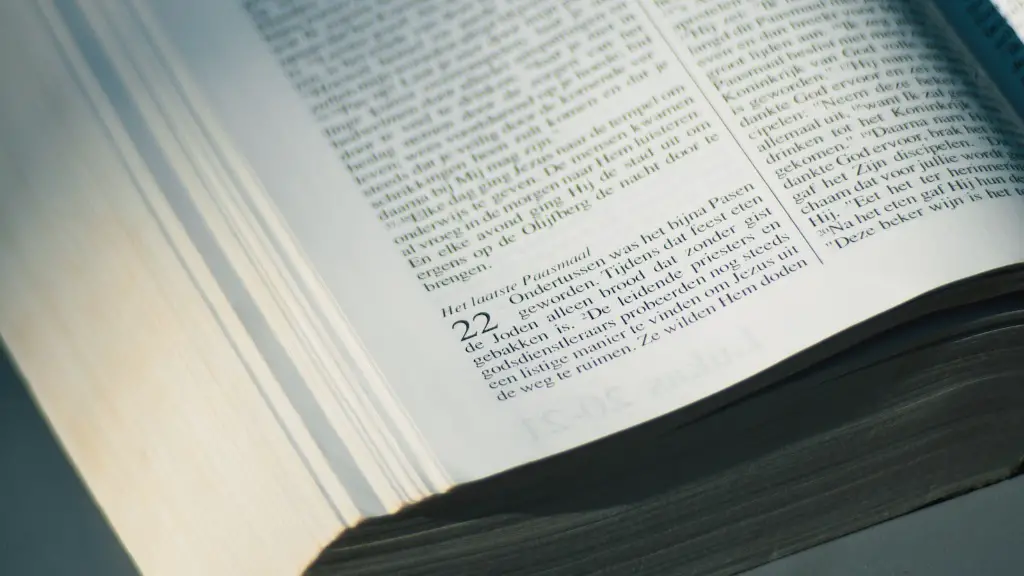What Does The Bible Say About Ghosts
The Bible contains references to ghosts, sometimes known as spirits, in the Old Testament, New Testament, and books of other religious authors such as the Apocrypha. In the Bible, there is a belief in the possibility of ghosts or spirits of the dead, who can either help or hinder the living.
The Bible often speaks of death as a form of sleep and sometimes speaks of life after death involving resurrection or reincarnation. It is clear that the Bible implies that there are people who have gone before us, who have passed away and have not yet been resurrected. The Bible also speaks of angels, who could be considered the “ghosts” of heavenly beings, although they are not dead, they are eternal living spirits.
The concept of ghosts is not given a clear definition in the Bible, however, some verses seem to imply that spirits of the dead, who have not yet been resurrected, may linger. These may be considered ghosts or spirits who are still active in the lives of the living, such as the spirit of Samuel, who spoke to Saul from the realm of the dead.
Biblical stories also speak of afflictions and possessions, which could be caused by ghosts. The New Testament speaks of certain ghostly entities that caused fear and terror in people and were driven away by the power of Jesus’s name.
Despite these references, overall the Bible does not really have a clear opinion on the existence of ghosts. While some might find references to hauntings or spirits in various biblical passages, interpreting them is often subjective. The Bible does, however, make it clear that Jesus is the one source of power over spirits and ghosts, and his name and the name of God are greater than the powers of darkness.
Cultural Beliefs
Regardless of the Bible’s ambiguity on the subject of ghosts, individual cultures have had their own traditions and belief systems about them for many centuries. During certain periods in history, people believed that ghosts existed due to superstitious fears of the unknown.
There were instances in which ghosts would be thought to be responsible for certain disturbing events, from strange noises at night to crop failures and droughts. In medieval times, people often turned to the church for protection from ghosts, and priests would often perform exorcisms to rid places of these supernatural entities.
In other cultures, ghosts were viewed with reverence and were thought to have special powers, such as being able to bring people luck or fortune. In some social circles, it was believed that ghosts could be called upon to bring messages or advice from the spiritual world.
In modern times, the belief in ghosts has been mostly reduced to a matter of personal preference or interpretation of the evidence. Consequently, people often have polar opposite opinions on the matter.
For some, ghosts are nothing more than a form of folklore and superstition, while others are adamant that ghosts exist and have a spiritual function. Despite modern skepticism, the belief in ghosts is still alive in many parts of the world, and for these believers, the answer to the question “what does the Bible say about ghosts” is that faith in Jesus is the best protection from any potential spirit.
Evidential Science
In the past few decades, the study of the paranormal and evidence for the existence of ghosts has become increasingly popular. People are now turning to the use of scientific instruments, cameras and other technologies to attempt to provide evidence of ghostly activity.
The field of parapsychology seeks to investigate paranormal events and phenomena through the systematic study of the living, the dead, and the environment. This field uses scientific methodologies to understand and explain psychic and metaphysical topics such as telepathy, psychokinesis and near-death experiences.
Parapsychologists try to study the paranormal through laboratory environments and field studies, testing electronic equipment, measuring the electromagnetic field and using audio, visual and olfactory recordings and sensors. These testings have yielded interesting results that suggest, at least to some degree, that the phenomena of hauntings and ghost activity exist in some form.
The possibility of ghosts and other paranormal occurrences cannot be completely ruled out, however, the exact nature of such entities and the process by which they manifest themselves is up for debate.
In conclusion, the Bible does not provide a definitive answer on the subject of ghosts, and what is given are either oblique references or uncertain passages that have been open to interpretation. In the modern age, scientific study and debate on the subject continues. Ultimately, the jury is still out on the existence and nature of ghosts, and opinions will continue to differ until a definitive answer is found.
Historical Cases
Throughout history, there have been many reported cases of paranormal activity associated with ghosts. From ancient times to the present, people have reported mysterious occurrences, from strange sightings to objects moving by themselves.
The most famous ghost story of all time is the story of Hamlet in the 16th century, in which the ghost of the murdered King Hamlet appears to his son as a warning from the afterlife. This story has been immortalized in literature and theater, and continues to inspire.
From Europe to Asia, stories of hauntings, poltergeists, and other types of supernatural activity have been recorded throughout the centuries. Even in the United States, some of the most famous hauntings have been reported in infamous places like the White House and Alcatraz prison. Although not all of these cases have been verified, they remain part of the literature and folklore of the world.
Perhaps the most famous case of ghostly activity in America was the famous Bell Witch haunting of the early 19th century. In this case, a family was tormented by an invisible entity for several years. The family experienced strange phenomena such as object manipulation, the dissemination of messages, and even physical assaults. The family eventually appealed to their local religious authorities for help in their plight, but due to the lack of awareness and understanding on the subject, the spirit was never officially identified or silenced.
It is clear from the historical evidence of ghostly activity that whatever we believe about the existence of ghosts and spirits, these entities have been part of the folklore and mythology of humanity for centuries.
Mystical Experiences
Apart from historical evidence, people have also reported first-hand experiences with ghosts. Some people have reported sensing strong emotions, seeing a strange apparition in their peripheral vision, hearing footsteps or strange noises, or experiencing physical sensations or alters in the environment when they believe they are in the presence of a ghost.
These anecdotal reports have caused some people to believe that ghosts are real, but it is important to note that not all experiences can be explained as paranormal or supernatural. Scientific research has been conducted to investigate the possibility of ghosts, but in most cases, the results have been inconclusive.
Perhaps the most interesting aspect of the belief in ghosts is the spiritual dimension that it brings. Some believe that religious traditions and teachings are all part of a greater plan for humanity, and that by maintaining faith in God, all of our fears, including the fear of ghosts, can be dissipated. In other words, belief in a higher power trumps fear of the unknown.
Ultimately, it is up to each individual to decide what to believe about ghosts and other supernatural forces. The Bible does not provide a definitive answer, but it does provide us with a framework to use in order to make sense of our experience. One thing is certain: belief in God is the most powerful protection we can have against any form of evil.
The Role of Faith
For Christians, faith in the Lord Jesus Christ is the only way to be truly protected from the spiritual forces of evil. In the Bible, God has promised to protect us from evil and to provide us with peace and safety. In order to receive this protection, we must put our trust in God and rely on Him for our daily needs.
The Bible also warns us not to trifle with the forces of darkness, for this will only lead to disaster. We must remain vigilant and trust in God, for He is our only protection from the supernatural forces of evil.
For those who are curious about ghosts, there is no easy answer. Many theories and interpretations exist, and evidence for the existence of ghosts is still open to debate. However, if one is open to the possibility of ghosts and other spirits, then putting one’s trust in God is the best way to ensure safety and peace of mind.
Protection Techniques
In cases of ghostly activity, a variety of techniques can be used to protect oneself or one’s loved ones from potential harm. Such techniques include avoiding dark or isolated places, not dwelling on negative thoughts and feelings, and conserving energy by engaging in physical activities and restorative practices such as meditation.
Religious practices such as prayer, lighting incense, or saying affirmations can also be used to ensure one’s safety. It is also important to keep one’s home environment clean and organized, as clutter can attract negative energy.
Ultimately, the best protection against ghosts and other supernatural forces is to trust in Jesus Christ and rely on His strength and power. It is important to remember that Jesus is greater than any evil or force of darkness, and that in Him we find refuge and protection.
Alternative Theories
In the modern age, many alternative theories on the supernatural have been proposed. Some people have suggested that ghosts are actually the manifestation of emotional trauma or spiritual energy left behind in certain locations after traumatic events.
Others have argued for a psychological explanation for ghostly phenomena, suggesting that certain mental states or psychological conditions could be responsible for the hallucinations of paranormal activity. Still others have suggested that ghosts may be extraterrestrial or interdimensional entities, suggesting that these entities are able to move between dimensions and manifest themselves in our reality.
No matter what one believes about the nature of ghosts, it is clear that there is no indisputable evidence to prove the existence of ghosts. Thus, interpretations of ghostly phenomena are highly subjective and personal.
Ultimately, the debate on ghosts and other supernatural phenomena is likely to remain unresolved unless scientific proof can be found to explain what is behind these occurrences. Until then, people will continue to debate the merits and validity of various theories.





